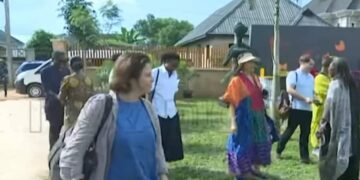Nigeria’s quest to strengthen the Great Green Wall (GGW) programme received a significant boost when stakeholders converged at the Banquet Hall of the Maryam Babangida National Centre for Women Development in Abuja on 28th and 29th October 2025, for the Validation Workshop of the Green Women Platform (GWP).
The GWP is a trailblazing initiative designed to equip Nigerian women with the necessary tools to take ownership of climate solutions that impact their lives, families, and communities.
There is no contesting the fact that women play fundamental roles in governance and decision-making around land use, natural resources, and climate action. The need to strengthen their capacity, therefore, cannot be underestimated.
This understanding informed the decision of critical stakeholders to convene for the validation workshop, where discussions focused on granting women access to economic opportunities in reforestation, renewable energy, sustainable agriculture, and green enterprises.
Balarabe Lawal is the Minister of Environment. He described the workshop as a milestone that marks the beginning of concrete actions to restore degraded lands, create jobs, empower women and youth, and build resilient communities.
The Minister emphasised that the exercise confirms the status of Nigerian women as leaders, innovators, and decision-makers in climate solutions, noting that “the Green Women Platform represents a movement for empowerment, advocacy, and transformation—enabling women to shape and drive sustainable environmental solutions nationwide.” He noted that validating and operationalising the platform positions Nigeria strategically.
The Director General of NAGGW, Mr Saleh Abubakar, described the GWP as an innovation within the Pan-African Great Green Wall initiative—one that places women at the centre of efforts to combat desertification, climate change, land degradation, and livelihood loss.
“Here in Nigeria, women are not only custodians of the land but also agents of transformation within their communities. This validation workshop allows us to finalise the GWP’s national framework, define its governance structures, and agree on a practical two-year action plan to guide implementation.”
He urged participants to actively engage in the deliberations to ensure the creation of a strong, inclusive platform that empowers women to build resilience, restore degraded lands, and promote sustainable livelihoods. Through this process, stakeholders are laying the foundation for a national movement that will restore lands, create economic opportunities, and deepen women’s leadership in environmental stewardship.
Reaffirming NAGGW’s commitment, Abubakar expressed optimism that the initiative would become a model for empowering rural women and youth to lead local climate solutions.
The GWP demonstrates Nigeria’s commitment to mainstream gender equality in the implementation of the Great Green Wall programme, ensuring that women play a central role in achieving national environmental and climate goals.
By establishing the platform, Nigeria aligns with the regional vision of the Pan-African Great Green Wall. It reaffirms its commitment to the United Nations’ Sustainable Development Goals (SDGs)—particularly those related to eradicating poverty, achieving gender equality, taking climate action, and preserving the planet’s life support systems. The initiative also supports the African Union’s Agenda 2063, which envisions an Africa whose development is driven by its people, relying on the potential of its citizens—especially women and youth.
This initiative reflects Nigeria’s collective resolve to mainstream gender equality into the Great Green Wall programme and ensure that women are not left behind in implementing Nigeria’s environmental and climate commitments.
Women bear the most significant burden of environmental degradation, yet they are also the most potent agents of resilience and adaptation. The workshop, therefore, aims to validate the structural framework, adopt a national governance arrangement, and agree on a two-year action plan for the GWP. These outcomes will empower women as beneficiaries and full partners in decision-making, resource mobilisation, and implementation.
The validation workshop reaffirms Nigeria’s commitment to the GGW initiative. It demonstrates a shift from concept to action—placing women at the centre of environmental restoration, climate resilience, and sustainable development.
Indeed, the fight against land degradation and climate change cannot be won without the leadership, creativity, and resilience of women.
Fundamentally, the GWP is not merely a programme but a movement for empowerment, advocacy, and transformation. It provides space for Nigerian women to take ownership of solutions affecting their lives, families, and communities.
Nigeria has consistently demonstrated leadership within the Great Green Wall initiative. From restoring degraded lands to promoting sustainable livelihoods, our programmes have become models for replication across Africa. By hosting this validation workshop, Nigeria once again sets the pace for other member states of the Pan-African Great Green Wall to follow.
This initiative also resonates with Agenda 2063 and aligns with key Sustainable Development Goals, including Goal 1: Ending Poverty; Goal 5: Gender Equality; Goal 13: Climate Action, and Goal 15: Life on Land.
By validating and operationalizing this platform, Nigeria is strategically positioning itself ahead of COP30 in Brazil, where inclusive, community-driven models of climate action will take centre stage.
The success of the Green Women Platform depends on partnerships and collective ownership. The government must sustain supportive policies and institutions, while development partners such as the World Food Programme and the Pan-African Great Green Wall Agency provide technical and financial backing.
Civil society and women’s associations are expected to ensure grassroots inclusion, guaranteeing that rural women, who bear the most significant burden of environmental degradation, are fully represented. The private sector also plays a crucial role by supporting women-led green enterprises and innovations. Furthermore, young people, especially young women, must be deliberately included to ensure intergenerational continuity of this movement.
Nigeria faces the twin challenges of desertification and poverty. This validation workshop marks the beginning of concrete actions to restore degraded lands, create jobs, empower women and youth, and build resilient communities.
The federal government, through this exercise, has reaffirmed its commitment to placing Nigerian women at the forefront of climate action. Women have long been the custodians of the land, sustaining families and local economies even in the face of climate-induced hardship. This milestone gives their voices, experiences, and ingenuity a formal structure within Nigeria’s climate action framework.
The GWP, first conceived in 2018, was designed to consolidate and harmonise women’s contributions across the Sahel—ensuring that their voices influence policies, their rights are protected, and their innovations are recognised in environmental governance.
The establishment of national chapters of the GWP, beginning with countries such as Burkina Faso, Niger, Nigeria, Chad, Mali, and Mauritania, was a crucial step in institutionalising women’s participation in land restoration and climate adaptation.
However, the success of the initiative will depend on partnerships and collective ownership, while the government continues to provide an enabling environment through supportive policies and institutions, such as the National Agency for the Great Green Wall.





